 I don't want to be critical of the OLPC project. Really. But it is interesting to see how the technology is being used. For starters, we already have DOOM ported over to the OLPC. Now I'm the first to say I have spent many an hour playing doom, but is this really the intention of the project? Or how about the one million OLPC's ordered by Nigeria to run scams? They can't even afford them in the first place.
I don't want to be critical of the OLPC project. Really. But it is interesting to see how the technology is being used. For starters, we already have DOOM ported over to the OLPC. Now I'm the first to say I have spent many an hour playing doom, but is this really the intention of the project? Or how about the one million OLPC's ordered by Nigeria to run scams? They can't even afford them in the first place.
I'm optimistic about the project, but right now I don't see a lot of lives in the targeted audience being affected for the better. Right now, it seems to be a device to practice being violent and to run scams - the only thing missing is the specialized porn application. Weighed from a green perspective, is the impact that these machines will have on the environment worth it, to promote violence and run scams?
 No, that's not a misspelling (and misspelled is also not misspelled BTW). "Glocal" is my new term for actions that you can do locally but affect things globally. This won out narrowly over the term 'lobal' which might actually be a word in itself.
No, that's not a misspelling (and misspelled is also not misspelled BTW). "Glocal" is my new term for actions that you can do locally but affect things globally. This won out narrowly over the term 'lobal' which might actually be a word in itself.
Anyways, Local Cooling is a new free power management tool. It's great, has a nice little interface and just the right amount of features, including (my favorite) don't shut the PC off if a particular application is running. It also estimates the power that your machine uses and how many trees/gallons of gas/kilowatt hours you are saving. For Windows XP only - it wold be nice if they open source it to get it going in many operating systems.
 Ok, for starters, let me just say that I think this picture of Bill taken at the innovation summit is a little unfair, surely there must have been a better one. Be that as it may, it's obvious that I should have been the keynote at this summit! Why? Well, because these great minds have been saying just what I have all along:
Ok, for starters, let me just say that I think this picture of Bill taken at the innovation summit is a little unfair, surely there must have been a better one. Be that as it may, it's obvious that I should have been the keynote at this summit! Why? Well, because these great minds have been saying just what I have all along:
Conducting business as usual, with finite energy resources and a growing population, means a lower standard of living, Sridhar warned. "We can't promise our children and grandchildren what all previous generations promised—that they can have a better future."
Taking an eco-responsible focus "is just good business... ...You can make more money because energy does cost money, and there's not a CEO in the world who doesn't understand that."
"Energy is becoming a defining issue of our time as we struggle with questions of how much we use and where we get it"
Yes, yes.
 Have you heard about the paper from Xerox that erases itself in 16 hours? I don't know what to make of this stuff. I'm all for cutting down on the average 1,200 pieces of paper that the average employee uses each month, almost half of which is for daily use, but I don't know if this is the right technology to do it.
Have you heard about the paper from Xerox that erases itself in 16 hours? I don't know what to make of this stuff. I'm all for cutting down on the average 1,200 pieces of paper that the average employee uses each month, almost half of which is for daily use, but I don't know if this is the right technology to do it.
For starters, it will erase itself. That's bad - what if I want it for 17 hours? I have no control over it, and I think that's a big part of paper use right now - control to file, read, use however you want, then throw away.
Secondly, it's a technology. The paper itself probably goes bad after a while, stops working so to speak. So if you print off a 500 page report on this stuff and 10 of pages don't register any marks or (worse) erase themselves in a few minutes, what do you do? And I doubt the cost of this stuff is anywhere near paper.
I see this as a Kick and Bite product, one that is being introduced to keep a legacy process up and running. I'm not saying paper will fully go away, but I'm pretty sure that electronic paper will never make it.
 Orca is an online webtop system that can resemble any desktop that is out there -Vista, XP, Mac, etc. There is a free demo that you can try out (IE only) that is pretty exciting; although still a little clunky, you can see where this is going. Bye bye, desktop, it was nice to know yuh.
Orca is an online webtop system that can resemble any desktop that is out there -Vista, XP, Mac, etc. There is a free demo that you can try out (IE only) that is pretty exciting; although still a little clunky, you can see where this is going. Bye bye, desktop, it was nice to know yuh.
 From the Blah, Blah, Blah department. A recent survey of 200 managers in the UK reported that about two-thirds thought that saving energy was important, but only 20 percent had performed an energy audit. Apparently 'awareness' is the problem:
From the Blah, Blah, Blah department. A recent survey of 200 managers in the UK reported that about two-thirds thought that saving energy was important, but only 20 percent had performed an energy audit. Apparently 'awareness' is the problem:
Zoe McMahon of HP admitted that IT suppliers had to do more to raise customer awareness about the cost effectiveness of energy-efficient systems. "Having the [energy efficient] technology is one thing, but a lot of people don’t think it exists," she said. "There is a lot of education that needs to be done, particularly around the simple steps you can take like activating power management capabilities on PCs."
Okay, so our top IT professionals aren't aware of power management capabilities on PCs. Check, please!
 We have the pedal powered laptop. Certainly when da Bomb hits this thing will be all the rage, until then, let's classify this as 'novelty'.
We have the pedal powered laptop. Certainly when da Bomb hits this thing will be all the rage, until then, let's classify this as 'novelty'.
 Apparently the iameco company is now vending a variety of computers and peripherals that are completely biodegradable. I've covered the wooden computer before (in woody two shoes and redux), but it sounds like this thing is taking it to the next level. Can you literally throw this thing in the garden when you are done with it? Maybe, I can't tell from their info site.
Apparently the iameco company is now vending a variety of computers and peripherals that are completely biodegradable. I've covered the wooden computer before (in woody two shoes and redux), but it sounds like this thing is taking it to the next level. Can you literally throw this thing in the garden when you are done with it? Maybe, I can't tell from their info site.
 Linutop is a diskless workstation that seems pretty interesting and well suited to delivering web based applications in a corporate environment. I'm really interested to see how much it costs, it should be down in the $20-$50 dollar range if it has any hopes of being competitive.
Linutop is a diskless workstation that seems pretty interesting and well suited to delivering web based applications in a corporate environment. I'm really interested to see how much it costs, it should be down in the $20-$50 dollar range if it has any hopes of being competitive.
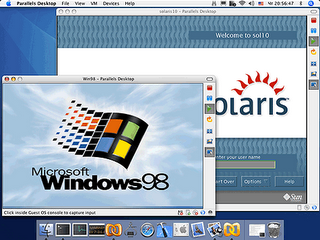 There are some good signs that server virtualization has gotten out of the early adopter phase and into the mainstream. Generally, this change happens when the exchange of pieces of papers with pictures of dead presidents on them can be increased or decreased. Yes! We are talking about money.
There are some good signs that server virtualization has gotten out of the early adopter phase and into the mainstream. Generally, this change happens when the exchange of pieces of papers with pictures of dead presidents on them can be increased or decreased. Yes! We are talking about money.
For starters, it looks like virtualization coupled with blade servers have the potential to reduce the complexity of your IT environment, potentially cutting the number of your servers in half. If you "get" this, you will be able to reduce your maintenence time and hardware costs.
Furthermore, PS&G is now offering rebates for every server that is converted to run in a virtual environment. The savings is substantial, up to 4 million dollars per customer. Again, if you "get" this, PSE&G is paying you to conserve energy, as virtualization runs more efficiently. People, this is free money - just make sure you apply before you start your virtualization project.
That's two ways to "get it"; here's another, more painful, way to "get" it. Apparently some outsourcers are saving a bundle of cash on virtualizing their servers, but still charging customer on a per server basis. Since it only takes 10 minutes to set up a virtual server as compared to 10 days for the typical "hard server", the margins on this are huge. Let's hope you are not "getting it" this way.
The biggest challenge will be to actually get your IT staff to "get" it, since you are basically going to reduce their hardware budget and (ultimately) staffing related to server mangement. They may feel that by "getting" it, their team will be "getting" it, and you will hear all sorts of mumbo-jumbo related to increased risk, sacrificing the existing level of service, etc. The key here is to have a green IT strategy where you focus on reducing your maintenance costs and put your IT people into more strategic endeavors such as solar, wind, etc. By doing this, they don't have to worry about "getting" it without "getting" it, and you can move forward by reducing costs. Get it?
 Here's a few desktop wallpapers to get the point home. Kind of Gary Larsenesque but with an environmental bent.
Here's a few desktop wallpapers to get the point home. Kind of Gary Larsenesque but with an environmental bent.
 Ndiyo is the Swahilil word for ''yes". It is also the name of a new ultra thin, ultra efficient computing system that is targeted towards developing countries. Similarly to the OLPC project, Ndiyo is using a thin client solution with Linux, Open Office, and Ubuntu.
Ndiyo is the Swahilil word for ''yes". It is also the name of a new ultra thin, ultra efficient computing system that is targeted towards developing countries. Similarly to the OLPC project, Ndiyo is using a thin client solution with Linux, Open Office, and Ubuntu.
It's a great idea, mainly because they are trying to address the biggest issue with getting computing going on a shoestring budget - skilled labor. Similiar to the Skolelinux project, the goal is to have a non-technical teacher get 20 workstations up and running in 40 minutes. Now, not to throw stones, but I challenge your IT department to do that. In addition, each Ndiyo terminal uses only 3 Watts, or about 5 if (gasp) you add in a mouse and keyboard. That's a little stark compared to a 400 Watt desktop with dual monitors.
As I've said before, the reluctance to introduce thin clients is not about saving money, it's about cutting maintenence budgets. The Ndiyo project comes very close to giving thin clients away, and IT still won't introduce them; they are terrified will be nothing to do when the desktops go away. How about using your new found free time to save the world?
 in just 36 days, businesses in the UK will need to be compliant with the WEEE directive. Basically that means producers of flat screens, printers and consumables will be legally responible for taking back their stuff and getting rid of it in an ecologically friendly manner. Too bad almost 40 percent of IT managers have never heard of WEEE.
in just 36 days, businesses in the UK will need to be compliant with the WEEE directive. Basically that means producers of flat screens, printers and consumables will be legally responible for taking back their stuff and getting rid of it in an ecologically friendly manner. Too bad almost 40 percent of IT managers have never heard of WEEE.
Do you WEEE? Here's a primer.
 The first OLPC's (I'll just turn that into a noun) have rolled off the assembly lines. From a green perspective, I'm excited about the project for a variety of reasons:
The first OLPC's (I'll just turn that into a noun) have rolled off the assembly lines. From a green perspective, I'm excited about the project for a variety of reasons:
- It breaks the Winintel buy/upgrade/throwaway cycle. Frankly, I don't know if the OLPC cycle will be much better, but I suspect it will be because it is designed with developing countries in mind, and developing countries are terrific at conserving resources. I'm not the only one.
- There are a lot of them. This is exciting because it means there are a lot of parts available. As every SA knows, scavenging works best if all of your machines are the same.
- It's right sized. I posted an article a while ago on using the 100 energy slaves we all have working for us on a daily basis. And, with the competition (the human brain) running at only 20 watts, these things have better be producing. In this regard, the OLPC laptops show great promise, as they only draw 2 to 3 watts. Basically, if they can do a tenth of what a human brain can do, they are a good bet. Compare this to a high end desktop running at 400 watts that has to do the work of 20 people.
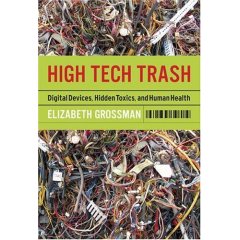 High Tech Trash by Elizabeth Grossman is the definitive work on eWaste, and this interview from Worldchanging sheds some interesting light on the subject. eWaste isn't the easiest waste stream in the world to recycle; Grossman reports it can take up to 15 minutes to dismantle a single piece of equipment. And even when you get the thing dismantled, the techniques for reclamation are crude. Grossman thinks, as I do, that electronic recycling starts with Reduce, with a big fat R:
High Tech Trash by Elizabeth Grossman is the definitive work on eWaste, and this interview from Worldchanging sheds some interesting light on the subject. eWaste isn't the easiest waste stream in the world to recycle; Grossman reports it can take up to 15 minutes to dismantle a single piece of equipment. And even when you get the thing dismantled, the techniques for reclamation are crude. Grossman thinks, as I do, that electronic recycling starts with Reduce, with a big fat R:
You have to figure out how you’re going to make products that never mind are just easier to dismantle and recycle, but also have longer lives, both physically and in terms of the technology; and being able to upgrade them so you don’t have to buy a whole new case every time you need something. And you have to actually make sure that you’re using not brand new virgin materials every time.
Although the book had had some criticism for being too general, I think it provides a nice overview of the topic and is certainly the most comprehensive work to date.
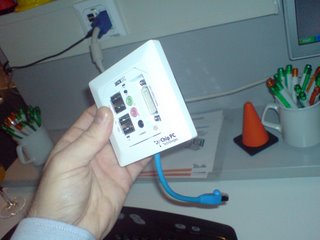 A big part of green computing is winning hearts and minds. Take that thing on the right, for example - see that? That's your new computer. That's because the desktop is going away. Maybe. Sometime. Many people have a hard time even thinking that thought.
A big part of green computing is winning hearts and minds. Take that thing on the right, for example - see that? That's your new computer. That's because the desktop is going away. Maybe. Sometime. Many people have a hard time even thinking that thought.
Another issue is related to the sharing of computer resources. This is something that is really taking off, particularly in virtualization. The problem here that a lot of business models can't account for this. According to Richard Curran of Intel:
"Virtualisation raises questions of politics, such as who owns the servers, who pays for them and who manages them... "They have to start thinking of the data centre as a shared capability, a service, not a room housing 'my box'."
Truer words were never spoken; however, it seems like sharing is left to children. But it seems like the virtualization is really where the server room is headed. Maybe. Sometime.
Finally, we have the changing of the operating system from Microsoft to Linux. Some folks think it is inevitable. Some have already done it. And eventually everyone will do it. Maybe. Sometime.
 By now, everyone knows that power costs are going to eat up one third of your IT budget in the next few years. Or maybe it's 40 percent of your budget. Fact is, no one really knows. But, as the saying goes, that's the problem with predicting the future; it hasn't happened yet.
By now, everyone knows that power costs are going to eat up one third of your IT budget in the next few years. Or maybe it's 40 percent of your budget. Fact is, no one really knows. But, as the saying goes, that's the problem with predicting the future; it hasn't happened yet.
But one thing you can be sure of is that vendors are going to duke it out as to who is the most energy efficient. Are Sun's Cool Threads really cool? Maybe not. How about Angstrom's Liqucool technology, which they claim will reduce energy use in the data center by 40 to 60 percent. One can even argue the whole debate is moot, because heating is good in cold climates anyways. Finally, HP and IBM are at it over their blade servers. Again.
Fact is, there is a simple litmus test for all of this - the first vendor to mention TCO loses. You know why? Because that means they are trying to bury their equipment's performance in the quagmire of IT, that discipline where 80 percent of initatives aren't even scoped out because 'IT is too complicated.' Bull. Plug a meter into it and give me the numbers.
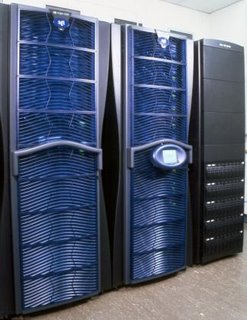 Supercomputers have been around since 1920, when IBM built custom tabulators for Columbia University. Nowadays they do just about everything from predicting weather to playing the stock market.
Supercomputers have been around since 1920, when IBM built custom tabulators for Columbia University. Nowadays they do just about everything from predicting weather to playing the stock market.
High-performance computing has (obviously) always been performance oriented. However, environmentalism is sneaking in here as well (some say the hippies are driving it), as supercomputing centers use vast amounts of energy. And, since peak performance is rarely attained, some of this energy consumption results in little or no performance gain. The problem is beginning to be studied; there is even a conference devoted expressly to this issue. There is also a site called Green 500 that ranks all of the supercomputers in the world by how ecofriendly they are. Like others, they are trying to determine the best way to do this, they have an RFC if you would like to contribute.
 Here's my second post in a continuing series of posts related to what the other guy is doing in green computing. I'm finding that there are so many stories on green computing recently that it's hard to even list them all. Here are some good ones:
Here's my second post in a continuing series of posts related to what the other guy is doing in green computing. I'm finding that there are so many stories on green computing recently that it's hard to even list them all. Here are some good ones:
IBM - they have announced their "Big Green" innovation plan with $100 million in funding. Also, the IBM blade servers are racking up efficiencies of up to 30 percent more than traditional servers.
Microsoft - Happen to be building aggressive, energy saving technology into Vista, primilarily by putting them to sleep after an hour. I don't see this as a big deal, SA's can do this now; in fact, one might see it as paternalistic. It will, however, save about 5 to 7 billion a year.
VMWare - is now offering businesses rebates between $750 and $1350 for every server that they unplug. Wow.
Final good news - Spending on green IT initiatives is up to 21 percent.
 It looks like Great Britian is taking the lead in legislating power consumption into action, particulatly with the climate change bill currently being proposed. This is hopeful, especially when a recent survey also reported than about 20 percent of IT dollars in selected European countries are going towards funding green IT initiatives.
It looks like Great Britian is taking the lead in legislating power consumption into action, particulatly with the climate change bill currently being proposed. This is hopeful, especially when a recent survey also reported than about 20 percent of IT dollars in selected European countries are going towards funding green IT initiatives.
It makes sense that England is doing this; energy is running about 7-7.1 (~14 cents) pence per kilowatt-hour there, and they don't have lot a lot of oil, or oil-related reserves to draw upon. Moreover, England has less and less influence to acquire them in the world market. I wouldn't be surprised if others countries follow suit quickly.
 You don't often think of environmental regulations when it comes to purchasing electronic equipment. But they're coming, and they are coming fast. The WEEE directive is one of the big daddies that is getting the ball rolling. WEEE is mandated in Europe and must be compiled with by July 2007. The sad thing is that 25 percent of IT directors are unaware of WEEE, and 40 percent don't understand what it means. The short of it is that it means two things. One, you will need to deal with your IT waste or be fined for improper disposal. Two, there is more of this coming; WEEE is mandated in Europe, but other countries are rapidly creating their own 'WEEE-like' laws. England, for example, is ready to ban the incandescent light bulb. Use any of those?
You don't often think of environmental regulations when it comes to purchasing electronic equipment. But they're coming, and they are coming fast. The WEEE directive is one of the big daddies that is getting the ball rolling. WEEE is mandated in Europe and must be compiled with by July 2007. The sad thing is that 25 percent of IT directors are unaware of WEEE, and 40 percent don't understand what it means. The short of it is that it means two things. One, you will need to deal with your IT waste or be fined for improper disposal. Two, there is more of this coming; WEEE is mandated in Europe, but other countries are rapidly creating their own 'WEEE-like' laws. England, for example, is ready to ban the incandescent light bulb. Use any of those?
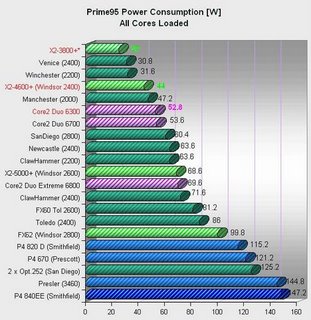 There has been quite a battle between the chip makers for some time now. It seems like each manufacturer is taking a different strategy when it comes to going green. What is interesting is that they are all going green, which is pretty exciting in itself. Here's a rundown:
There has been quite a battle between the chip makers for some time now. It seems like each manufacturer is taking a different strategy when it comes to going green. What is interesting is that they are all going green, which is pretty exciting in itself. Here's a rundown:
VIA - The new guy on the block, seems to have a holistic marketing strategy. Their chips are low power, they offset the carson emissions on the chip, and now they are working in South Africa to bridge the digital divide. Definitely the crunchiest of the bunch, doing the most.
Intel - I don't know what is going on with these guys frankly. Definitely very much into the new multicore offerings that are rolling off the assembly line. These bode well for the future as the designers will have more silicon than they know what to do with, and the 5,000 core CPU is already within reach. In fact, Intel has already done the 80 core chip. But ultimately, Im not sure if this saves energy or puts all of your processing power in one place. They say it does.
AMD - probably the most recognized brand for energy efficient chips, definitely helped their their affiliation with Sun. Ironically, Sun is pushing their green campaign and AMD is mostly riding on their coattails, when in fact most of the energy savings of the Sun products comes from the AMD chips!
 Dan Briody is jealous of Dave Douglas, the VP of eco-responsiblity at Sun. Because it's such a cool job. And also the fact thats what Sun is pushing is so inevitably the future that he wants to be a part of it. Also add in Ed Cone, who also sees the massive benefits to the green revolution. Now if just the business owners could...
Dan Briody is jealous of Dave Douglas, the VP of eco-responsiblity at Sun. Because it's such a cool job. And also the fact thats what Sun is pushing is so inevitably the future that he wants to be a part of it. Also add in Ed Cone, who also sees the massive benefits to the green revolution. Now if just the business owners could...
 Computers, that is. In the entire world. At least, that's what Greg Matter from Sun thinks. And I don't think he too far wrong.
Computers, that is. In the entire world. At least, that's what Greg Matter from Sun thinks. And I don't think he too far wrong.
Here's a quote to flesh this out (from Greg):
I'm just saying that there will be, more or less, five hyperscale, pan-global broadband computing services giants. There will be lots of regional players, of course; mostly, they will exist to meet national needs. That is, the network computing services business will look a lot like the energy business: a half-dozen global giants, a few dozen national and/or regional concerns, followed by wildcatters and specialists.
I seriously agree with him. As I have said several times before, we only need one email provider in the world. Just one, that's it. Google is my choice. No more spam, no more huge bandwidth requirements. Just logon to Google and type.
 Nicholas Carr has a lovely article on something he calls Frugal Computing. First, I love the catchphrase - it's fresh and new, a little bit of a downer (who wants to be frugal), but I like it anyways. To quote from a quote, Carr mention that Gilder mentioned that;
Nicholas Carr has a lovely article on something he calls Frugal Computing. First, I love the catchphrase - it's fresh and new, a little bit of a downer (who wants to be frugal), but I like it anyways. To quote from a quote, Carr mention that Gilder mentioned that;
George Gilder writes that "in every era, the winning companies are those that waste what is abundant – as signalled by precipitously declining prices – in order to save what is scarce." What is abundant today, he argues, is information technology - in particular, computing cycles, data storage, network bandwidth. Google, writes Gilder, operates a "massively parallel, prodigally wasteful petascale computer" in order to be "parsimonious with that most precious of resources, users' patience."
This really does cut to the issue, all this computer equipment is implemented to preserve user patience. The problem is that these days, no one really knows what patience is when it comes to computing. When I started using computers in grade school, I used to lug home these huge terminals, which you connected to the mainframe via a telephone line. I remember 300 baud where you could read the data off the screen as it was being typed. I distinctly remember 19,200 as well, because at that speed the whole screen would fill up with text almost immediately. And I thought, wow, this is great.
I also remember 25 Mhx processors, where doing anything even remotely interesting took several days to run. Where creating a zip file took 2 or 3 hours. You had to be careful because one mistake could be hours or days wasted.
As Carr notes, things have advanced so much that now things like processing power, hard drive space, and network capacity are 'free', and are treated as such. The problem is is that they are really not. It reminds me a lot of the meatpacking industry, where the steak is just served up on the plate. No one really cares how it is delievered, until, of course, you can't get steak.
 Well, he's just your local friendly IT wizard. Or he could be the guy that fixes your machine. Or the guy that programs the accounting system. Or maybe he's the guy that manages your IT department.
Well, he's just your local friendly IT wizard. Or he could be the guy that fixes your machine. Or the guy that programs the accounting system. Or maybe he's the guy that manages your IT department.
He's your local witch doctor. Typically he does much more dancing than work. I'm not saying every department has a witch doctor (in fact, most don't), but it only takes a few to leave a big impression. Just look at that guy!
 to be inefficent. At least, that's what the British government is saying by proposing to outlaw traditional light bulbs in three short years. Now, this is the start of something big for the electronics industry. I can see a not too distant future where governments start outlawing inefficient processors, inefficient laptops, monitors filled with lead, etc. More and more, my hope in government is restored!
to be inefficent. At least, that's what the British government is saying by proposing to outlaw traditional light bulbs in three short years. Now, this is the start of something big for the electronics industry. I can see a not too distant future where governments start outlawing inefficient processors, inefficient laptops, monitors filled with lead, etc. More and more, my hope in government is restored!
 I enjoy tracking the progress towards the green IT goal. Every so often, I see a few things here and there where I think 'now there's a milestone'. A lot of times they are related to a huge company doing something that you have never heard of them doing before. Here are a few of those.
I enjoy tracking the progress towards the green IT goal. Every so often, I see a few things here and there where I think 'now there's a milestone'. A lot of times they are related to a huge company doing something that you have never heard of them doing before. Here are a few of those.
- Home Depot, for example, is starting to sell solar panels to mainstream America.
- Staples is now offering environmentally friendly paper. This is not too surprising, but that fact that the product is certified by the Forest Stewardship Council is, because they take into account certain non-business elements such as indigenous peoples' rights and community relations.
- VIA's carbon free computing campaign is impressive.
- Finally, Al Jazerra themselves have said that energy consumption will be one of the primary components in triggering ecosystem collapse. Now, that's a new angle!
- Oh, and half of Europe lost power today. Not for the last time.
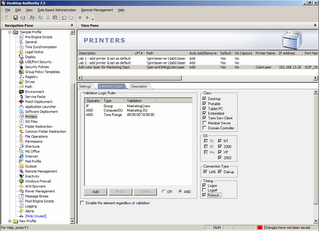 Green Business News often has stories related to green IT. They have a nice review on a product from ScriptLogic called Desktop Authority. DA does many things, but one of the things is power managment. And with 36 percent of all desktop being left on all night long, that's probably something that could save big bucks.
Green Business News often has stories related to green IT. They have a nice review on a product from ScriptLogic called Desktop Authority. DA does many things, but one of the things is power managment. And with 36 percent of all desktop being left on all night long, that's probably something that could save big bucks.
After seeing a lot of these types of products, I'm convinced that the decision to leave a computer on all night long is a primitive one. By that, I mean that I think people really do think about turning off their computer; in fact, I think most people think about doing it every single day. But the decision to not turn it off is primal, a classic short term gain over long term benefit trade off. And since it cost employees nothing to leave their machine on, all's it takes is just one more tiny thing to make the decision ("I might need it bright and early in the morning, fast!") Again, I think most people make this decision every day.
A lot of IT decisions really boil down to just two options - you can change people's behavior, or you can have a machine solve the problem. Often I have found that the slant is towards the machine. If you feel you really need desktops (and there are many compelling arguments why you dont), it seems like you will need one of these software packages as well. The danger is that your employees may be less inclined to activitely contribute to your green efforts if they see the Technological Fix being applied, which will leave them powerless. And as we all know, something without power doesn't run very well.
 Leadership is something that is never in large supply. To be a leader, you have to see things that others don't see; so, almost by definition, there just aren't a lot of leaders around at any given moment.
Leadership is something that is never in large supply. To be a leader, you have to see things that others don't see; so, almost by definition, there just aren't a lot of leaders around at any given moment.
That's too bad, because what we really need right now in IT is people who can take the green football and run with it. It's really getting down to the time where it's no more business as usual; things are changing, and if you don't change, well, someone else will make you change. And that someone else is going to be the government. In a report commissioned by the UK Government and headed by ex-Chief Economist of the World Bank Nicholas Stern, it was estimated that approximately 20 percent of all economic activity is going to vanish due to man made global warming. Politicans, for all the evil they might do, just aren't going to let that happen; they are going to prevent it by doing what they do best, which is regulate the tarnish out the industries that are causing the problem. And that industry, front and center, is IT.
WEEE and RoHS are just the beginning on this one. Politicans are going to look at numbers like these, where 30 percent of the UK power is going towards running ofice equipment and they are going to act, and not in a slow way. In like a punitive way, a way that lets them tax the tarnish out of business and lets the money flow into public coffers. And I promise you, they don't take prisoners, don't care if you go bankrupt or not.
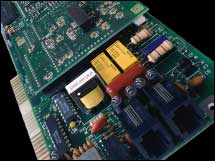 Sales of PC boards have dropped dramatically. This year there was only 8.8 percent growth, down from a historical average of 15 percent. Henry King, the analyst at Goldman Sachs, had this to say:
Sales of PC boards have dropped dramatically. This year there was only 8.8 percent growth, down from a historical average of 15 percent. Henry King, the analyst at Goldman Sachs, had this to say:
"While we maintain our positive view on Vista's impact on the PC upgrade cycle for the next three years, we believe Vista has shifted (fourth-quarter motherboard) seasonality to early 2007," King said.
Positive View, that the key phrase here. These new operating systems seem to get churned out just in time to save the associated hardware industry. But the question you have to ask yourself is - is this the right move for you?
 Walmart is going to start selling these notebooks, dubbed the "world's most efficient laptop", they clock in at just 12 watts. This wouldn't be be such a bad energy slave to have around, the specs are fine for most work and I bet the battery life is fantastic.
Walmart is going to start selling these notebooks, dubbed the "world's most efficient laptop", they clock in at just 12 watts. This wouldn't be be such a bad energy slave to have around, the specs are fine for most work and I bet the battery life is fantastic.
 I don't want to be critical of the OLPC project. Really. But it is interesting to see how the technology is being used. For starters, we already have DOOM ported over to the OLPC. Now I'm the first to say I have spent many an hour playing doom, but is this really the intention of the project? Or how about the one million OLPC's ordered by Nigeria to run scams? They can't even afford them in the first place.
I don't want to be critical of the OLPC project. Really. But it is interesting to see how the technology is being used. For starters, we already have DOOM ported over to the OLPC. Now I'm the first to say I have spent many an hour playing doom, but is this really the intention of the project? Or how about the one million OLPC's ordered by Nigeria to run scams? They can't even afford them in the first place.





























